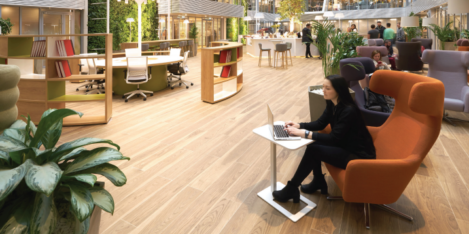To provide the best experiences, we use technologies like cookies to store and/or access device information. Consenting to these technologies will allow us to process data such as browsing behaviour or unique IDs on this site. Not consenting or withdrawing consent, may adversely affect certain features and functions.
The technical storage or access is strictly necessary for the legitimate purpose of enabling the use of a specific service explicitly requested by the subscriber or user, or for the sole purpose of carrying out the transmission of a communication over an electronic communications network.
The technical storage or access is necessary for the legitimate purpose of storing preferences that are not requested by the subscriber or user.
The technical storage or access that is used exclusively for statistical purposes.
The technical storage or access that is used exclusively for anonymous statistical purposes. Without a subpoena, voluntary compliance on the part of your Internet Service Provider, or additional records from a third party, information stored or retrieved for this purpose alone cannot usually be used to identify you.
The technical storage or access is required to create user profiles to send advertising, or to track the user on a website or across several websites for similar marketing purposes.
 Some things will never change. IN Magazine continues to offer the best content you can find on the changing world of work. The digital edition of Issue 3 is now available and print copies will be posted out later in the week. More →
Some things will never change. IN Magazine continues to offer the best content you can find on the changing world of work. The digital edition of Issue 3 is now available and print copies will be posted out later in the week. More →






 A new survey published by
A new survey published by 
 Employees are longing for purposeful and visible changes to increase safety measures in the office, according to a new survey of 2,000 people from
Employees are longing for purposeful and visible changes to increase safety measures in the office, according to a new survey of 2,000 people from 
 Under-35s are in the midst of a professional confidence crisis, with work seen as a place where they feel isolated and afraid to speak out, claims research carried out by culture change business
Under-35s are in the midst of a professional confidence crisis, with work seen as a place where they feel isolated and afraid to speak out, claims research carried out by culture change business 


 A new survey from
A new survey from 
 Fairness around office rota decisions and implementation is a top employee concern, claims new research by
Fairness around office rota decisions and implementation is a top employee concern, claims new research by 


 More than 11 million UK working adults have taken time off work for poor mental wellbeing, costing businesses an estimated 40 million working days each year, claims new research from healthcare provider,
More than 11 million UK working adults have taken time off work for poor mental wellbeing, costing businesses an estimated 40 million working days each year, claims new research from healthcare provider, 
 Water cooler chats and the buzz of office life is set to remain on hold until at least the New Year as businesses look to restructure their office needs from January. A government drive to see more office employees return to work in the workplace has seen a rise in commuters to more than 60 percent according to the latest figures from the
Water cooler chats and the buzz of office life is set to remain on hold until at least the New Year as businesses look to restructure their office needs from January. A government drive to see more office employees return to work in the workplace has seen a rise in commuters to more than 60 percent according to the latest figures from the 











September 23, 2020
The stage is set for the next phase of working life
by Mark Eltringham • Comment, Flexible working, Technology, Wellbeing, Working lives